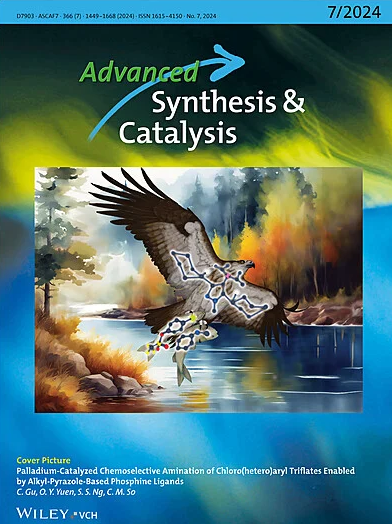Polymer‐Confined Pd Nanocatalysts: Tailoring Adsorption Geometry for Enhanced Selectivity in Sustainable Alkylphenol Synthesis via Ketone Hydrodeoxygenation
IF 4
2区 化学
Q2 CHEMISTRY, APPLIED
引用次数: 0
Abstract
The development of sustainable synthetic routes to access valuable alkylphenols is hampered by the poor selectivity, harsh conditions, and waste associated with traditional methods. Catalytic hydrodeoxygenation (HDO) of readily available aromatic ketones offers a potentially greener alternative, but achieving high chemoselectivity under mild conditions remains challenging. Herein, a simple yet effective strategy is reported employing a polymer‐modified palladium on carbon (Pd/C) catalyst, functionalized with dimethylamine (DMA) polymer chains (Pd/C‐DMA), for the highly efficient and selective HDO of aromatic ketones. This catalyst achieves outstanding selectivity (up to 96.6%) toward alkylphenols with complete conversion under remarkably mild conditions (80 °C, 5 bar H聚合物约束钯纳米催化剂:调整吸附几何结构以增强酮氢脱氧可持续合成烷基酚的选择性
传统方法的选择性差、条件苛刻和浪费等问题阻碍了可持续合成途径获取有价值烷基酚的发展。芳香族酮的催化加氢脱氧(HDO)提供了一个潜在的更环保的选择,但在温和的条件下实现高化学选择性仍然是一个挑战。本文报道了一种简单而有效的策略,采用聚合物修饰的碳上钯(Pd/C)催化剂,用二甲胺(DMA)聚合物链(Pd/C‐DMA)功能化,用于芳香酮的高效和选择性HDO。该催化剂在非常温和的条件下(80°C, 5 bar H2)对烷基酚的完全转化具有出色的选择性(高达96.6%),显著优于未改性的Pd/C,并且在工艺绿色方面有了实质性的改善。机理分析表明,DMA聚合物层在催化剂表面创造了一个受限的微环境。这种约束效应,通过空间约束和氢键相互作用,强制酮底物具有特定的端对吸附几何形状,抑制了不希望发生的副反应,如芳烃环氢化。Pd/C‐DMA催化剂具有广泛的底物相容性(对多种酮的收率为95%),并促进了有价值的中间体的可扩展合成,为烷基酚的生产提供了一个强大和可持续的平台。
本文章由计算机程序翻译,如有差异,请以英文原文为准。
求助全文
约1分钟内获得全文
求助全文
来源期刊

Advanced Synthesis & Catalysis
化学-应用化学
CiteScore
9.40
自引率
7.40%
发文量
447
审稿时长
1.8 months
期刊介绍:
Advanced Synthesis & Catalysis (ASC) is the leading primary journal in organic, organometallic, and applied chemistry.
The high impact of ASC can be attributed to the unique focus of the journal, which publishes exciting new results from academic and industrial labs on efficient, practical, and environmentally friendly organic synthesis. While homogeneous, heterogeneous, organic, and enzyme catalysis are key technologies to achieve green synthesis, significant contributions to the same goal by synthesis design, reaction techniques, flow chemistry, and continuous processing, multiphase catalysis, green solvents, catalyst immobilization, and recycling, separation science, and process development are also featured in ASC. The Aims and Scope can be found in the Notice to Authors or on the first page of the table of contents in every issue.
 求助内容:
求助内容: 应助结果提醒方式:
应助结果提醒方式:


